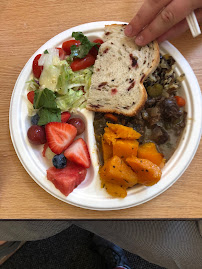|
A plate of food during a feast at the |
The Environmental Institute at Fond du Lac Tribal and Community College (Cloquet, Minn.) studies promotes sustainable agriculture, and other topics through the use of a medicinal garden, beehives, and a greenhouse. I am fortunate to work for the Institute as a part-time student.
Recently we celebrated Sustainability Awareness Week. We kicked off with a feast of Indigenous foods: fried walleye, maple roasted squash, manoomin (wild rice), cranberry bread, and Baby Cakes (cupcakes baked with wild rice flour and maple syrup made by an Ojibwe mother/daughter team).
Before feasts, tobacco and prayers are offered. At one of our feasts, we all stood waiting patiently. I was anxious, however, as no one knew who was going to offer the prayer. One young woman was asked to give the prayer. She said she couldn’t because she didn’t know Ojibwe well enough. Someone replied, “If you didn’t have a voice do you think the Great Spirit wouldn’t know when you were praying.”
 |
Cupcakes made with wild rice flour and maple syrup by Baby Cakes Wild Rice Bakery/Savage Girls Salads |
I particularly liked it when she asked, “If you didn’t have a voice would the Great Spirit hear you.” The answer is, “Of course, the Great Spirit would hear you!”
My role at the feast was to facilitate composting. I collaborated with other team members to make sure we had compostable dinnerware and contacted Western Lake Superior Sanitary District (WLSSD) to reserve a party kit (which included special bins, compostable liners, and signage) and transport it. At the college, I cheerfully informed people that their dinnerware and all food waste were compostable and showed them exactly where they could dispose of their waste. I’ve found that many people want to do the right thing but are confused. This is true at church. People are often unsure of what they need to dispose of is recyclable or compostable.
A coworker and fellow student, Haley, poses beside he composting and recycling station. The large green bags in nearest to her are compostable plasticand are used to collect the dinnerware and leftovers.
I suggest you think of God when you recycle or compost. Unlike, humans God doesn’t waste anything. I think composting is actually a miracle. Make it into an act of conscious gratefulness to the Lord. (God will hear you if even you don’t vocalize it.) Consider when Jesus fed the multitude with 5 loaves and 2 fish in John 6:12, after the meal he said, “Gather the pieces that are left over. Let nothing be wasted.”
(Naomi Yaeger is a commissioned United Methodist Earthkeeper. Contact her at sun_dog_press@yahoo.com, phone or text (218) 591-5277. For more information visit https://umcmission.org/EarthKeepers/)
“Gather the pieces that are left over. Let nothing be wasted.”
John 6:12
 |
| This venison stew was actually served at another feast than the one the other writes about in this post. It included cranberry and maple syrup. |




